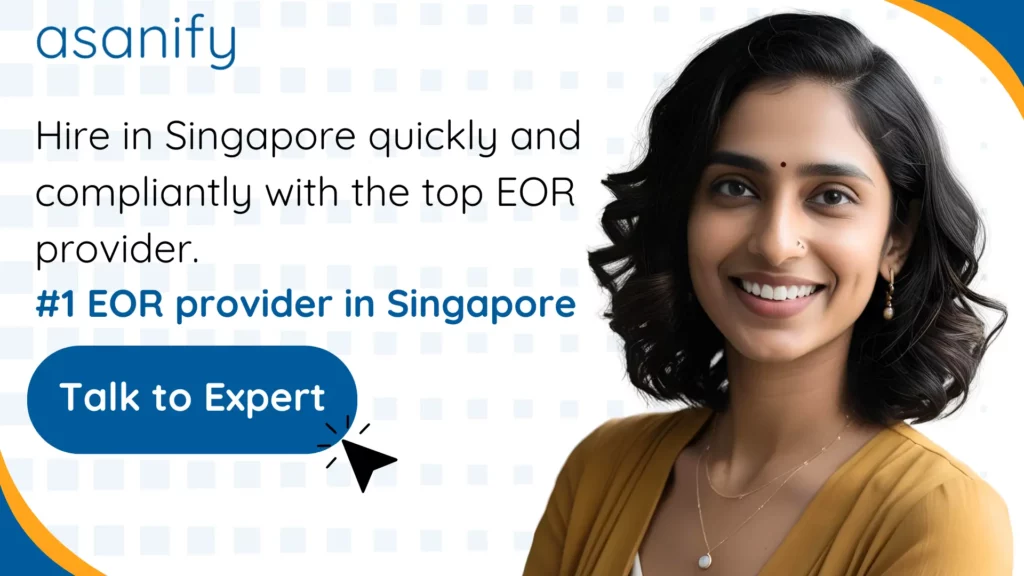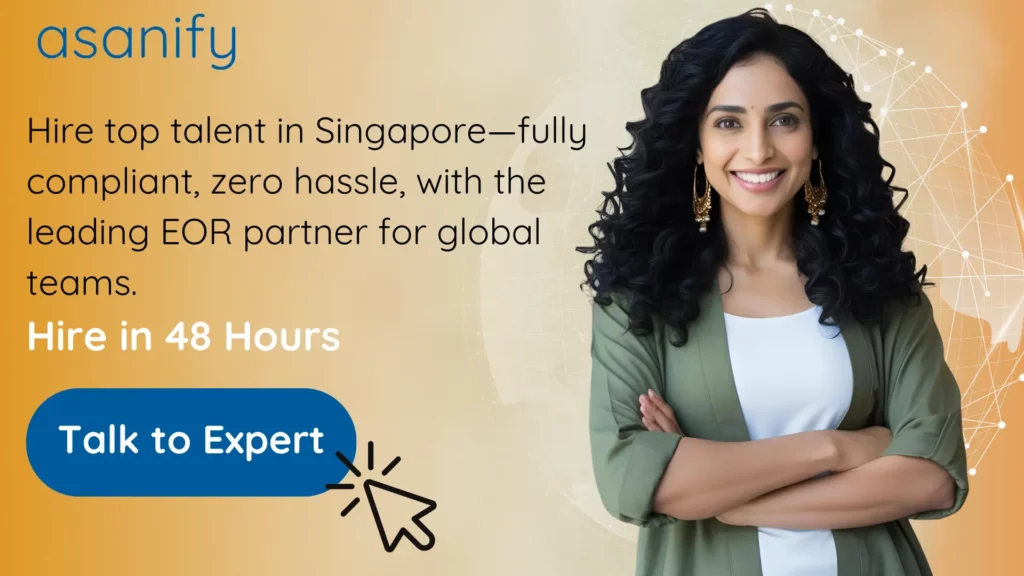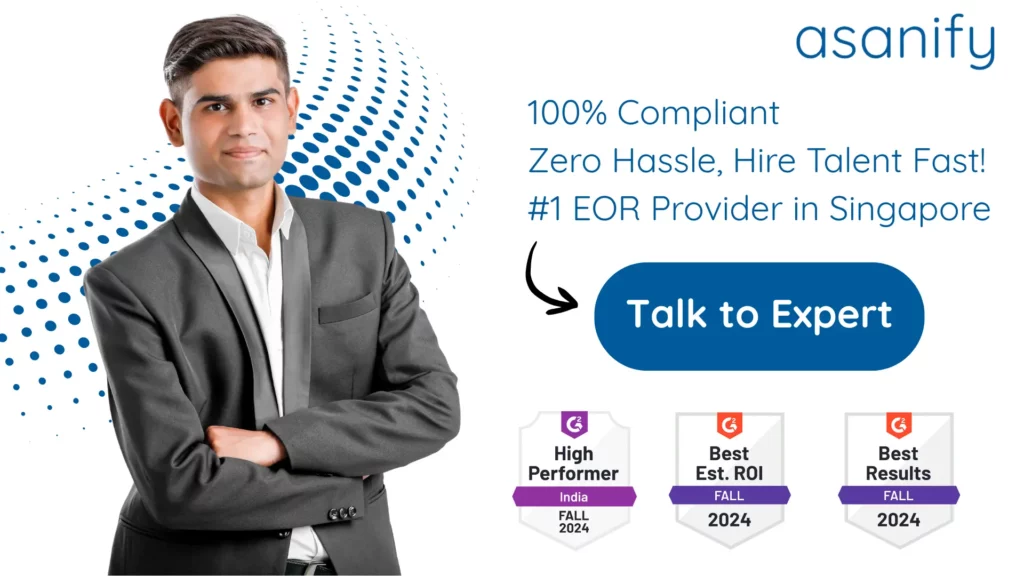Singapore is a top destination for global companies expanding into Southeast Asia, thanks to its skilled workforce, English-speaking talent, and business-friendly environment. While remote hiring in Singapore offers flexibility and access to top-tier talent without establishing a local entity, it comes with regulatory complexities involving the Employment Act, CPF contributions, and Ministry of Manpower (MOM) compliance. For most businesses, two primary hiring models exist: Entity Establishment in Singapore, such as setting up a Private Limited Company, or partnering with an Employer of Record (EOR). This guide helps you assess which model—Entity Establishment in Singapore or EOR—is best suited for your hiring strategy in 2025.
Table of Contents
- EOR vs. Setting Up an Entity in Singapore
- Cost Implications of Entity vs. EOR in Singapore
- Compliance and Legal Exposure: Entity vs. EOR
- Foreign Compliance: Setting Up a Legal Entity vs. Using EOR
- Switching from EOR to Entity Establishment in Singapore
- Choose Asanify for EOR in Singapore
- FAQs
- Conclusion
EOR vs. Setting Up an Entity in Singapore
Setting up an entity in Singapore provides full operational control but involves complex registration and long-term commitment. EORs, on the other hand, offer a fast and compliant hiring solution—ideal for testing the market or scaling quickly.
An EOR enables foreign companies to legally hire local talent without setting up a branch or subsidiary. It acts as the legal employer while you retain control over day-to-day activities. This significantly reduces administrative workload, ensures compliance, and provides scalability.
Factors to Consider When Choosing EOR or Entity Establishment
When deciding between an EOR and setting up a legal entity, consider:
- Speed of hiring: EORs can onboard within days, while entity setup may take weeks or months depending on paperwork and regulatory delays.
- Strategic goals: EORs work well for short- to mid-term plans and testing the market; legal entities suit long-term investments and customer-facing operations.
- Compliance burden: Entity setup involves ongoing tax filings, CPF payments, audits, and more. An EOR manages these for you, offering peace of mind.
Additionally, consider the flexibility that an EOR provides. If business goals change or the market doesn’t perform as expected, you can quickly scale down operations without worrying about dissolving a company.

Why Time to Market Matters for Global Companies
In fast-moving industries, entering Singapore quickly gives businesses a competitive edge. Legal incorporation may delay market entry. EORs eliminate this delay by enabling compliant employment from day one.
Time to market is critical in high-growth sectors like SaaS, fintech, and e-commerce. Delays in hiring due to slow incorporation can lead to missed revenue, slower development cycles, and competitors capturing market share. By contrast, an EOR allows you to start operating within a week.
Cost Implications of Entity vs. EOR in Singapore
Understanding the financial trade-offs between an EOR and entity setup is crucial for budget planning. While entities offer long-term advantages, they come with significant overheads that may not be feasible for startups or early market entry.
Setup and Maintenance Costs
- Entity: Company incorporation fees, nominee directors (if needed), accounting, tax compliance, registered office, and audit costs. The average setup cost is SGD 5,000–10,000, not including ongoing overhead.
- EOR: A monthly service fee bundled with payroll, statutory contributions, and HR support. EORs typically charge USD 300–1,000 per employee monthly depending on services provided.
Compliance Costs
- Entity: Monthly CPF contributions, IRAS filings, annual general meetings, employment passes for foreign hires, and insurance coverage.
- EOR: All-inclusive handling of payroll, CPF, income tax, and benefits. No separate filings are required by the client.
Time Savings
- EORs enable onboarding in 5–10 business days.
- Entity setup usually takes 4–6 weeks, depending on structure and documentation.
With an EOR, time saved translates into faster project execution and earlier revenue realization.
Suggested Read: Pay Contractors in Singapore: A Complete Guide to the Hiring Process
Compliance and Legal Exposure: Entity vs. EOR
Singapore has clear labor and tax laws enforced by the Ministry of Manpower (MOM) and Inland Revenue Authority (IRAS). Non-compliance can lead to penalties or legal disputes.
An EOR helps mitigate these risks by:
- Drafting MOM-compliant contracts
- Managing CPF contributions and tax withholdings
- Ensuring adherence to local leave and termination laws
- Ensuring compliance with employee insurance and annual leave policies

Foreign Compliance: Setting Up a Legal Entity vs. Using EOR in Singapore
Setting Up a Legal Entity
To register a private limited company in Singapore, you must:
- Choose a company name and register with ACRA
- Appoint at least one local director
- Set up a corporate bank account
- File annual returns and tax reports
- Maintain accounting records and hire licensed tax professionals
This process is ideal for long-term strategic presence, brand localization, and full financial control, but comes with significant obligations.
Using an Employer of Record (EOR)
With an EOR, you can:
- Hire employees without incorporating locally
- Ensure full labor and tax compliance
- Avoid the costs and complexity of direct registration
- Receive localized HR support and legal expertise instantly
- Terminate employment without legal exposure
Switching from EOR to Entity Establishment in Singapore
Startups and SMEs often begin with an EOR and switch to entity setup as operations grow.
When to switch:
- You plan to scale long-term
- You want direct client invoicing and full control
- You need to build a physical presence in Singapore
Steps to transition:
- Set up your legal entity
- Coordinate with the EOR to transfer employment contracts
- Align benefits and payroll systems
- Notify authorities and manage CPF account migration

Choose Asanify for EOR in Singapore
Asanify is a trusted Employer of Record (EOR) partner for companies hiring in Singapore. With strong expertise in MOM regulations, CPF compliance, and local employment laws, Asanify enables seamless onboarding in under 7 business days. It offers MOM-compliant contracts, automated payroll and tax filing, and bilingual support for smooth operations. The platform also features a real-time HR dashboard, integrated payroll, and employee self-service portals. Asanify supports your growth across Asia and ensures an easy transition when you’re ready to set up your own entity—making it ideal for startups and global teams scaling quickly and compliantly.
Suggested Read: EOR Singapore: A Detailed Guide 2025
Conclusion
Singapore is a gateway to Asia, offering global companies access to a skilled and stable workforce. However, local compliance, CPF contributions, and regulatory filings make hiring complex. Choosing between an EOR and entity establishment depends on your growth stage and risk tolerance.
For most businesses looking to enter or scale quickly, an EOR offers a compliant, fast, and low-risk path to hiring in Singapore. Asanify streamlines this journey—helping you hire, onboard, and grow without operational friction.
FAQs
An EOR legally employs your workers and handles payroll, CPF, taxes, and compliance on your behalf.
It ensures compliance with MOM regulations, including contract rules, CPF contributions, and leave policies.
Fees include a monthly service charge plus employee costs like salary, CPF, and insurance.
Yes. EORs ensure access to CPF, paid leave, and statutory insurance coverage.
EORs handle salary calculations, CPF deductions, IR8A tax forms, and pay disbursement.
Yes, but it’s important to classify them properly to avoid hidden employment risk.
EOR is faster and lower risk; entities offer full control but require local registration and filing.
Yes. Contracts must be in English and comply with the Employment Act.
Yes, the EOR is the legal employer and provides full-time status under Singapore law.
The Central Provident Fund is Singapore’s social security scheme. Both employer and employee contribute.
Not to be considered as tax, legal, financial or HR advice. Regulations change over time so please consult a lawyer, accountant or Labour Law expert for specific guidance.

